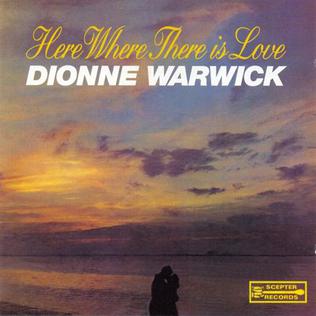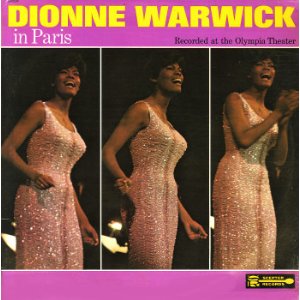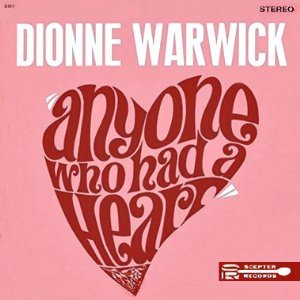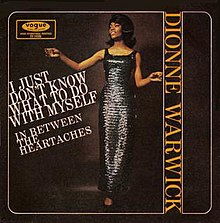
Marie Dionne Warwick is an American singer, actress, and television host.

Burt Freeman Bacharach was an American composer, songwriter, record producer, and pianist who is widely regarded as one of the most important and influential figures of 20th-century popular music. Starting in the 1950s, he composed hundreds of pop songs, many in collaboration with lyricist Hal David. Bacharach's music is characterized by unusual chord progressions and time signature changes, influenced by his background in jazz, and uncommon selections of instruments for small orchestras. He arranged, conducted, and produced much of his recorded output.

Soulful is the twelfth album by Dionne Warwick. Released in 1969 on Scepter Records, it was the first of Warwick's Scepter albums that did not directly involve her longtime production and songwriting team of Burt Bacharach and Hal David. Instead, the album was produced by Warwick and Chips Moman and was composed of covers of soul hits and soul-influenced pop songs.
"That's What Friends Are For" is a song written by Burt Bacharach and Carole Bayer Sager.

"Anyone Who Had a Heart" is a song written by Burt Bacharach (music) and Hal David (lyrics) for Dionne Warwick in 1963. In January 1964, Warwick's original recording hit the Top Ten in the United States, Canada, Spain, Netherlands, South Africa, Belgium and Australia.

"Do You Know the Way to San Jose" is a 1968 popular song written and composed for singer Dionne Warwick by Burt Bacharach. Hal David wrote the lyrics. The song was Warwick's biggest international hit to that point, selling several million copies worldwide and winning Warwick her first Grammy Award. David's lyrics tell the story of a native of San Jose, California, who, having failed to break into the entertainment field in Los Angeles, is set to return to her hometown.

"Walk On By" is a song written by Burt Bacharach and Hal David for singer Dionne Warwick in 1963. The song peaked at number 6 on the US Billboard Hot 100 and number 1 on the Cash Box Rhythm and Blues Chart In June 1964 and was nominated for a 1965 Grammy Award for the Best Rhythm and Blues Recording.

"Don't Make Me Over" is a song written by Burt Bacharach and Hal David, originally recorded by American singer Dionne Warwick in August 1962 and released in October 1962 as her lead solo single from her debut album, Presenting Dionne Warwick (1963), issued under Sceptor Records. The song reached number 21 on the US Billboard Hot 100 and number five on the Billboard Hot R&B Singles chart.
"Make It Easy on Yourself" is a popular song written by Burt Bacharach and Hal David which was initially a hit for Jerry Butler in 1962. The best-known version is the 1965 recording by the Walker Brothers, for whom it was a No. 1 UK and Canadian hit. Dionne Warwick, who made a demo of the song in early 1962, later had a hit with it in 1970.

"This Guy's in Love with You" is a hit song written by Burt Bacharach and Hal David and released by Herb Alpert in May, 1968. Although known primarily for his trumpet playing as the leader of the Tijuana Brass, Alpert sang lead vocals on this solo recording, which was arranged by Bacharach. An earlier recording of the song by British singer Danny Williams with different lyrics, titled "That Guy's in Love", appeared on Williams' 1968 self-titled album.

Away We a Go-Go is a 1966 album by Smokey Robinson & the Miracles. The album features the singles "(Come 'Round Here) I'm the One You Need", a Billboard top 20 Pop hit, written and produced by Holland-Dozier-Holland; and "Whole Lot of Shakin' in My Heart ", written and produced by Frank Wilson. The album uses a different take of "I'm the One You Need" than what was issued on the single. A third single was planned for release from this album, the tune "More, More, More ", cataloged as Tamla T-54005, but the single was never released. It was later covered by the regional group Bob Brady and The Con Chords. Another single from this album, the Stevie Wonder/Ivy Jo Hunter composition of "Can You Love a Poor Boy", was released to radio stations as a special Disc Jockey Advanced Single, Tamla T-540, but was never given an official catalog number for general release. It too, inspired cover versions by Gil Bernal and Ronnie Walker.
"Wishin' and Hopin'" is a song, written by Hal David and Burt Bacharach, which was a US Top 10 hit for Dusty Springfield in 1964.

Here Where There Is Love is Dionne Warwick's sixth studio album for Scepter Records, and was released on December 4, 1966. The album was recorded at Bell Sound Studios in New York City and was produced in full by Burt Bacharach and Hal David with Bacharach also arranging and conducting.

Dionne Warwick in Paris is Dionne Warwick's sixth album, and was released on April 14, 1966 on Scepter Records. It was recorded during Warwick's five-week engagement at the Paris Olympia in January 1966 and was released shortly after the tour was completed. The LP was issued as number 534 in the Scepter Catalog. The liner of this LP is pink with three pictures of Warwick side-by-side, not unlike the Make Way for Dionne Warwick album two years earlier.

Dionne Warwick in Valley of the Dolls is the title of Dionne Warwick's ninth album for the Scepter label. It was recorded during the summer and fall of 1967 and was released early the next year in March 1968. It was recorded at A&R and Bell Sound Studios in New York City and was produced by Burt Bacharach and Hal David.

Tommy Hunt is an American soul/northern soul singer, and a 2001 Rock and Roll Hall of Fame Inductee as a member of famed R&B group The Flamingos.

Anyone Who Had a Heart is the second album by the American singer Dionne Warwick, released in 1964 on the Scepter label. It was produced by Burt Bacharach and Hal David.

Presenting Dionne Warwick is the debut studio album by American singer Dionne Warwick. It was released by Scepter Records on April 10, 1963 in the United States. Composers Burt Bacharach and Hal David provided three-quarters of the track listing, having met Warwick during the summer of 1961 at Bell Sound Studios when she was working as a background singer during the recording session for The Drifters' minor hit "Mexican Divorce" (1962). The songwriters would go on to become frequent collaborators on subsequent Warwick projects. Presenting Dionne Warwick peaked at number 14 on the UK Albums Chart and spawned the lead single "Don't Make Me Over" which reached number five on the US Hot R&B Singles chart and became a top-forty hit on several international charts.

"Message to Michael" is a song written by Burt Bacharach and Hal David, that has been a hit for several different artists under several different titles. The song was first recorded as "Message to Martha" by Jerry Butler in 1962. In 1964, singer Lou Johnson had a minor US hit with the song, with the title "Kentucky Bluebird". British singer Adam Faith also recorded the song as "A Message to Martha " in 1965, and had a substantial hit with it in the UK, reaching No. 12. Exactly the same recording was issued in Australia as "Message to Martha", where it was a No. 15 hit for Faith. In the United States, Dionne Warwick's version, titled "Message to Michael", was a top ten hit there in 1966.
"Trains and Boats and Planes" is a song written by composer Burt Bacharach and lyricist Hal David. Hit versions were recorded by Bacharach in 1965, by Billy J. Kramer and the Dakotas in the same year, and by Dionne Warwick in 1966.


















